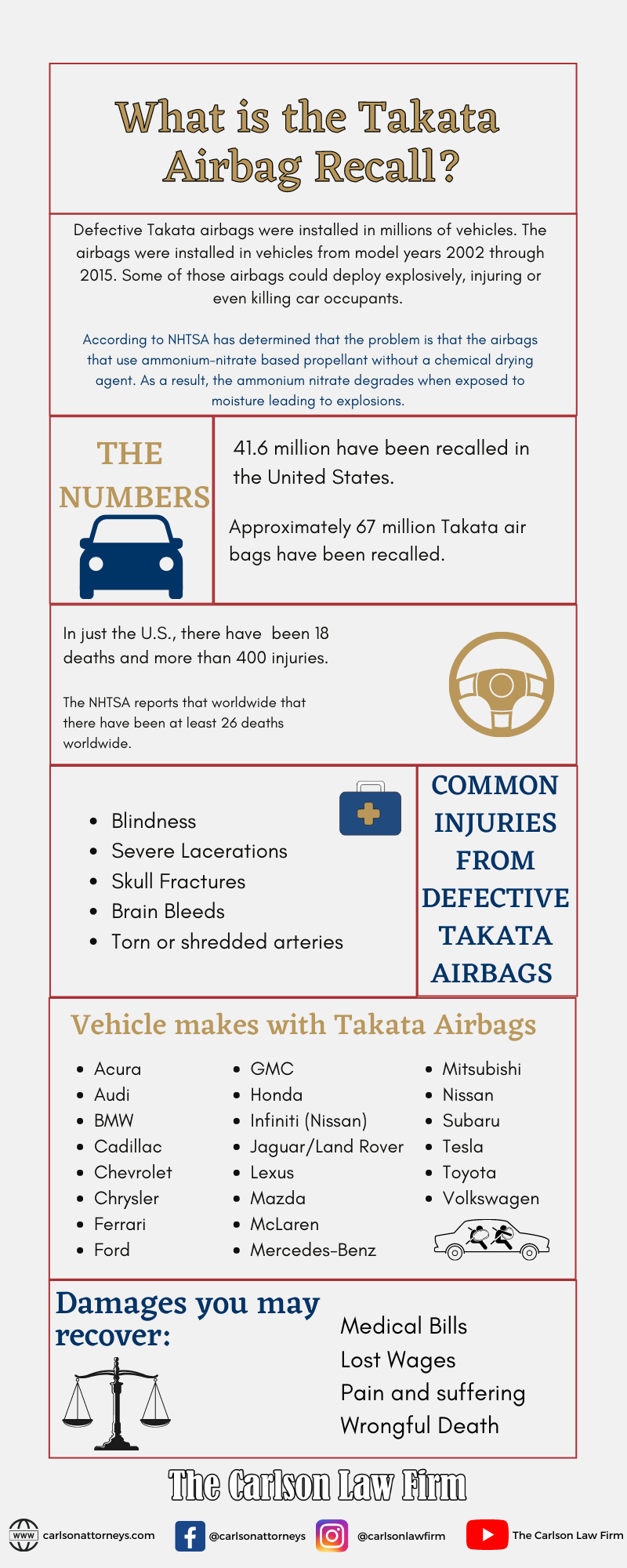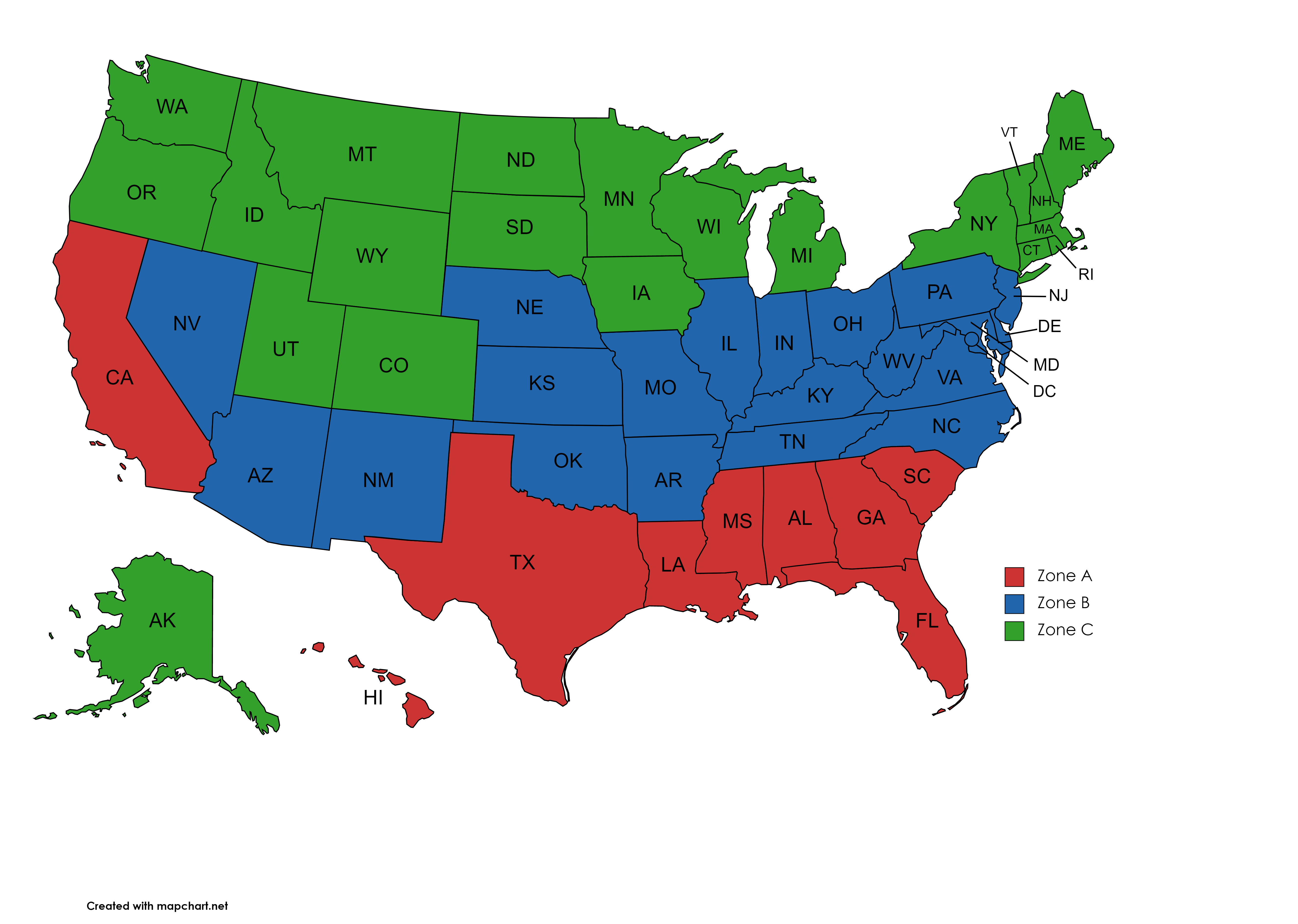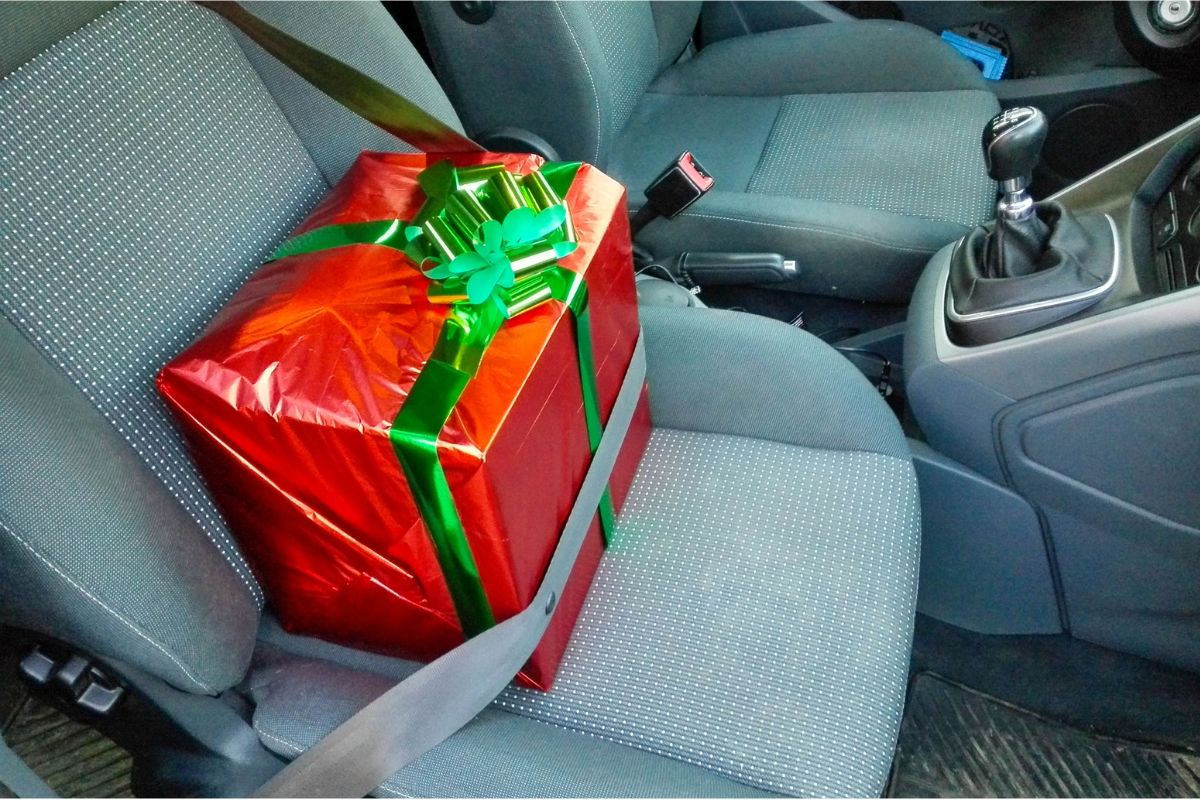Defective airbags made by Takata have been linked to at least 23 deaths and over 300 injuries worldwide. As of 2018, at least 15 of those deaths and 278 of those injuries occurred in the United States alone. Six years ago, 3.6 million Takata airbags were recalled for their potential to inflate and send shrapnel into passengers. Since then, the Takata airbag recall has grown into the largest in American automotive history. The Takata airbag recall notice covers both luxury and more affordable brands.
 The recall is so widespread that many consumers have become confused and frustrated, and are left wondering if their car is affected, and what to do if so.
The recall is so widespread that many consumers have become confused and frustrated, and are left wondering if their car is affected, and what to do if so.
What You Need to Know About Takata Defective Airbags
As of 2021, according to the National Highway Traffic Safety Administration, there are approximately 67 million vehicles under recall to replace the defective and potentially deadly airbag inflators. Given the number of vehicles affected, and the seriousness of the injuries reported, receiving a Takata airbag recall notice may scare you. Receiving the notice means that you will likely have your vehicle repaired in the coming weeks. Upon receiving the Takata recall notice, it is important that you begin making arrangements to get the necessary repairs as soon as possible. This repair may save you or a loved one’s life.
What is Responsible for Takata Airbag Defects?
Takata designed the defective airbags using ammonium nitrate as a propellant in its inflators. Unfortunately, the Japanese automotive parts company failed to include a drying agent. Ammonium nitrate degrades when exposed to moisture.
Ignition of the airbag inflator and degraded ammonium nitrate propellant can lead to an explosion. This explosion shatters the inflators and sends shrapnel into the passenger compartment and into the face, neck, and torso of passengers—leading to deadly injuries.
In many cases, these deadly airbags deploy without cause. In other cases, they malfunction as a result of minor accidents. Since the 1950s, cars have come equipped with airbags to save lives. Instead, Takata’s negligent design is responsible for taking lives and injuring hundreds of people around the globe.
Common Injuries Caused by Defective Takata Airbags
In many of the tragedies involving defective Takata airbags, the victims were in minor car accidents. In fact, these crashes are so small that under normal circumstances, victims should have survived or escaped with few injuries. However, Takata’s negligence led to exploding airbags that shot metal shrapnel at high rates of speed at the faces and neck of vehicle occupants. Victims suffer from the following conditions:
- Eye injuries
- Severe lacerations
- Skull fractures
- Brain bleeds
- Torn or shredded arteries
- Stab or gunshot wound-like injuries
The human torso, neck, and head hold a person’s most important organs and major arteries. The injuries can require a victim to undergo immediate emergency surgery, reconstructive surgery or lead to permanent damage and injuries such as blindness and brain injuries.
How Does Climate Affect Defective Takata Airbags?
The National Highway Traffic Safety Administration (NHTSA) issued a warning that vehicles exposed to long-term high heat and humidity can cause the Takata airbags to explode. Many of the vehicles under recall are in states like Texas, California, and Florida where the heat and humidity can make the chemicals inside the airbags even more unstable.
Recall Zones Based on Temperature and Humidity
Because these airbags become increasingly unstable in persistently high humidity and temperatures, NHTSA has broken the U.S. and its territories into three zones based on recall priority. This categorization is based on the state’s weather conditions and the likelihood of Takata airbag components degradation.
Takata Recall Zones

Zone A
This is the highest priority zone. If you receive a recall notice and live in one of the following states, seek repairs immediately.
Alabama, California, Florida, Georgia, Hawaii, Louisiana, Mississippi, South Carolina, Texas, American Samoa, Guam, the Northern Mariana Islands (Saipan), Puerto Rico and the U.S. Virgin Islands.
Zone B
Vehicles in Zone B are in the second-highest priority zone. While not as urgent as Zone A, drivers should seek vehicle repairs the moment parts become available.
Arizona, Arkansas, Delaware, District of Columbia, Illinois, Indiana, Kansas, Kentucky, Maryland, Missouri, Nebraska, Nevada, New Jersey, New Mexico, North Carolina, Ohio, Oklahoma, Pennsylvania, Tennessee, Virginia and West Virginia.
Zone C
Although Zone C is the lowest priority, taking immediate action the moment parts become available to you will keep you and your loved ones safe.
Alaska, Colorado, Connecticut, Idaho, Iowa, Maine, Massachusetts, Michigan, Minnesota, Montana, New Hampshire, New York, North Dakota, Oregon, Rhode Island, South Dakota, Utah, Vermont, Washington, Wisconsin and Wyoming.
What Are Alpha Airbags?
While Takata airbags have made headlines from the last several years, you may be unfamiliar with what NHTSA considers alpha airbags. These are airbags with high-risk inflators that pose a 50 percent risk of launching shrapnel after an explosion. For owners of the following vehicles, the necessary parts for repairs are currently available.
NHTSA considers the following vehicles at a much higher risk for an airbag explosion:
- 2001-2003 Honda and Acura vehicles
- 2006 Ford Ranger
- 2006 Mazda B-Series trucks
NHTSA warns that these vehicles can and should receive immediate repairs. The agency also warns that these vehicles should not be driven until the inflators receive replacement parts and repairs.
Vehicle makes and models included in the Takata airbag recall:
Acura:
2003 Acura 3.2CL
2002-2003 Acura 3.2TL
2013-2016 Acura ILX
2013-2014 Acura ILX Hybrid
2003-2006 Acura MDX
2007-2016 Acura RDX
2005-2012 Acura RL
2009-2014 Acura TL
2009-2014 Acura TSX
2010-2013 Acura ZDX
Audi:
2005-2008 Audi A4 Avant
2007-2009 Audi A4 Cabriolet
2005-2008 Audi A4 Sedan
2010-2012 Audi A5 Cabriolet
2006-2011 Audi A6 Avant
2005-2011 Audi A6 Sedan
2009-2012 Audi Q5
2017 Audi R8
2008 Audi RS 4 Cabriolet
2007-2008 Audi RS 4 Sedan
2005-2008 Audi S4 Avant
2007-2009 Audi S4 Cabriolet
2005-2008 Audi S4 Sedan
2010-2012 Audi S5 Cabriolet
2007-2011 Audi S6 Sedan
2016-2017 Audi TT
BMW:
2008-2013 BMW 1 Series
2000-2013 BMW 3 Series
2001-2003 BMW 5 Series
2013-2015 BMW X1
2007-2010 BMW X3
2001-2003 BMW X5
2007-2013 BMW X5
2008-2014 BMW X6
2010-2011 BMW X6 Hybrid
Cadillac:
2007-2014 Cadillac Escalade
2007-2014 Cadillac Escalade ESV
2007-2013 Cadillac Escalade EXT
Chevrolet:
2007-2013 Chevrolet Avalanche
2007-2014 Chevrolet Silverado HD
2007-2013 Chevrolet Silverado LD
2007-2014 Chevrolet Suburban
2007-2014 Chevrolet Tahoe
Chrysler:
2005-2015 Chrysler 300
2007-2009 Chrysler Aspen
2007-2008 Chrysler Crossfire
Daimler Trucks North America (Sterling Bullet)
2008-2009 Sterling Bullet
Daimler Trucks North America (Sterling Bullet)
2007-2009 Dodge Sprinter
2007-2017 Freightliner Sprinter
2010-2017 Mercedes-Benz Sprinter
Dodge/Ram:
2008-2014 Dodge Challenger
2006-2015 Dodge Charger
2005-2011 Dodge Dakota
2004-2009 Dodge Durango
2005-2008 Dodge Magnum
2003-2008 Dodge Ram 1500/2500/3500 Pickup
2005-2009 Dodge Ram 2500 Pickup
2007-2010 Dodge Ram 3500 Cab Chassis
2006-2009 Dodge Ram 3500 Pickup
2008-2010 Dodge Ram 4500/5500 Cab Chassis
Ferrari:
2010-2015 Ferrari 458 Italia
2014-2015 Ferrari 458 Speciale
2015 Ferrari 458 Speciale A
2012-2015 Ferrari 458 Spider
2016-2017 Ferrari 488 GTB
2016-2017 Ferrari 488 Spider
2009-2014 Ferrari California
2015-2017 Ferrari California T
2013-2017 Ferrari F12
2016-2017 Ferrari F12 tdf
2016 Ferrari F60
2012-2016 Ferrari FF
2017 Ferrari GTC4Lusso
Fisker (Karma):
Ford:
2007-2010 Ford Edge
2006-2012 Ford Fusion
2005-2006 Ford GT
2005-2014 Ford Mustang
2004-2011 Ford Ranger
GMC:
2007-2014 GMC Sierra HD
2007-2013 GMC Sierra LD
2007-2014 GMC Yukon
2007-2014 GMC Yukon XL
Honda:
2001-2012 Honda Accord
2001-2011 Honda Civic
2003-2011 Honda Civic Hybrid
2001-2011 Honda Civic NGV
2010-2015 Honda Crosstour
2002-2011 Honda CR-V
2011-2015 Honda CR-Z
2003-2011 Honda Element
2010-2014 Honda FCX Clarity
2007-2013 Honda Fit
2013-2014 Honda Fit EV
2010-2014 Honda Insight
2002-2004 Honda Odyssey
2003-2015 Honda Pilot
2006-2014 Honda Ridgeline
2006-2010 Honda GL1800 Gold Wing (motorcycle)
*High-Risk Honda Models:
2001-2002 Honda Civic
2001-2002 Honda Accord
2002-2003 Acura TL
2002 Honda CR-V
2002 Honda Odyssey
2003 Acura CL
2003 Honda Pilot
Infiniti:
2003-2008 Infiniti FX
2001 Infiniti I30
2002-2004 Infiniti I35
2006-2010 Infiniti M
2002-2003 Infiniti QX4
Jaguar/Land Rover:
2009-2015 Jaguar XF
2007-2012 Land Rover Range Rover
Jeep:
2007-2016 Jeep Wrangler
Lexus:
2007-2012 Lexus ES350
2010-2017 Lexus GX460
2006-2013 Lexus IS250/350
2010-2015 Lexus IS250C/350C
2008-2014 Lexus IS F
2012 Lexus LFA
2002-2010 Lexus SC430
Lincoln:
2007-2010 Lincoln MKX
2006-2012 Lincoln Zephyr/MKZ
Mazda:
2004-2009 Mazda B-Series
2007-2012 Mazda CX-7
2007-2015 Mazda CX-9
2003-2015 Mazda6
2006-2007 Mazda Mazdaspeed6
2004-2006 Mazda MPV
2004-2011 Mazda RX-8
McLaren:
Mercedes-Benz
2005-2015 Mercedes-Benz C-Class
2010-2011 Mercedes-Benz E-Class
2011-2017 Mercedes-Benz E-Class Cabrio
2010-2017 Mercedes-Benz E-Class Coupe
2009-2012 Mercedes-Benz GL-Class
2010-2015 Mercedes-Benz GLK-Class
2009-2011 Mercedes-Benz ML-Class
2009-2012 Mercedes-Benz R-Class
2007-2008 Mercedes-Benz SLK-Class
2011-2015 Mercedes-Benz SLS-Class
Mercury:
2006-2012 Milan
Mitsubishi:
2012, 2014, 2016, 2017 Mitsubishi i-MiEV
2004-2007 Mitsubishi Lancer
2004-2006 Mitsubishi Lancer Evolution
2004 Mitsubishi Lancer Sportback
2006-2009 Mitsubishi Raider
Nissan:
2001-2003 Nissan Maxima
2002-2004 Nissan Pathfinder
2002-2006 Nissan Sentra
2007-2012 Nissan Versa
Pontiac:
2003-2010 Pontiac Vibe
Saab:
2005-2006 Saab 9-2x
2006-2011 Saab 9-3
2006-2009 Saab 9-5
Saturn:
2008-2009 Saturn Astra
Subaru:
2003-2006 Subaru Baja
2009-2013 Subaru Forester
2004-2011 Subaru Impreza (Including WRX/STI)
2003-2014 Subaru Legacy
2003-2014 Subaru Outback
2006-2014 Subaru Tribeca
2012-2014 Subaru WRX/STI
Scion:
2008-2015 Scion xB
Tesla:
Toyota:
2003-2013 Toyota Corolla
2003-2008 Toyota Corolla Matrix
2009-2013 Toyota Matrix
2004-2005 Toyota Rav4
2002-2007 Toyota Sequoia
2011-2014 Toyota Sienna
2003-2006 Toyota Tundra
2006-2011 Toyota Yaris (Hatch back)
2007-2012 Toyota Yaris (Sedan)
Volkswagen:
2010-2014 Volkswagen Eos
2010-2014 Volkswagen Golf
2013 Volkswagen Golf R
2009-2013 Volkswagen GTI
2012-2014 Volkswagen Passat
2006-2010 Volkswagen Passat Sedan
2006-2010 Volkswagen Passat Wagon
Complete a vin-search to check the airbag recall status of your vehicle
In order to obtain the most accurate information about the airbag recall, drivers are urged to do a VIN-search. Your VIN is a 17-character code that is unique to your vehicle. Your VIN can be found on the driver’s side of the dashboard, on your title, registration, and insurance card. You can do a VIN search on the National Highway Traffic Safety Administration’s Recall Lookup site. to find out if your vehicle is on the Takata Airbag Recall list.
Why is the Takata Recall Occurring in Phases?
Given the scale of this recall, and the reality that some airbags may have to be replaced a second time, this industry-wide recall will take years to get the millions of replacement airbags produced and installed into affected vehicles. Because of the size of the recall and the limited availability of parts, the Takata defective airbag recall has been carried out in phases. There were millions of inflators involved in the Takata recall campaign, NHTSA created a plan with automakers to accelerate the installations of high-priority airbags (Because a vehicle can have multiple airbags, NHTSA has generally talked about inflators rather than vehicles.)
The plan for the replacement process was broken into 10 groups, based on the age of the vehicles, and focused on locations that have dramatic temperature changes and high humidity.
Each recalled group of vehicles are expected to take 2.5 years to repair, according to NHTSA. So if the final recall occurred in 2020, that means that repairs won't be completed until late 2022 or early 2023.
What You Can Do While Waiting for a Takata Airbag Replacement
If the recall on your car involves only the front passenger-side airbag, then don’t let anyone sit in that seat. But if you use the VIN-lookup tool and it says that the problem involves the driver’s side, you should do what you can to minimize your risk. If possible, consider:
- Minimize your driving
- Carpool with someone whose vehicle is not affected by the recall
- Utilize public transportation
- Rent a car
- Focus on safe driving best practices to minimize the risk of a crash
Where You Can Take Your Recalled Vehicle
Once you’ve identified that your vehicle is, in fact, a recalled vehicle, call a local dealer and get it fixed for free. You do not have to take your vehicle to the dealership where you purchased the vehicle. In addition, your vehicle does not need to be under warranty. Repairs will always be free of charge.
The Dangers of Used Cars
Older vehicles often have had multiple owners and sometimes transactions aren't recorded. This results in the potential for recall notices not making it to the right hands. Further, there is no federal requirement that sellers of used cars fix safety recalls, let alone even disclose them to potential buyers. When purchasing a used car, it is even more prudent that you take all the necessary precautions before buying.
How The Defective Airbag Attorneys at The Carlson Law Firm Can Help
If you or a loved one have suffered injury by a defective Takata airbag, you should consult with an experienced product liability attorney as soon as possible. If you are injured in a collision in which the airbag malfunctioned, you could bring a product liability lawsuit against the manufacturer of the airbag.
At The Carlson Law Firm, we have extensive experience representing victims of airbag injury. Contact us today for a free consultation.




